Spider-view: "Spider-Man 2099" (Spider-Man 2099, Part 1)
This three-issue narrative definitively introduces an amazing (if not spectacular) version of Marvel's famous web-headed hero
—by Nathan on February 17, 2024—
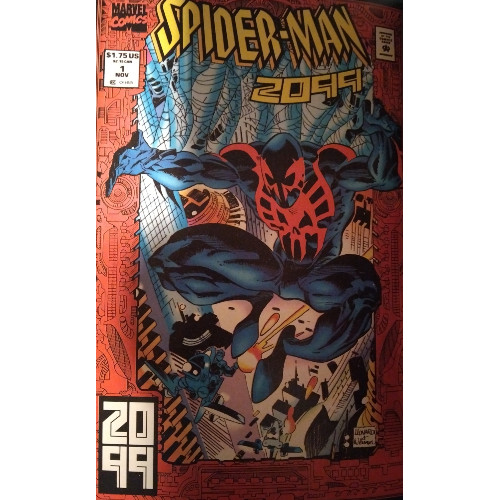
The year is 1992. The new millennium is less than a decade away, and an idea begins circulating around the Marvel offices to produce a lineup of books examining how the Marvel Universe would look a hundred years in the future. Among these titles are new, futuristic versions of the Punisher, the X-Men, Doctor Doom, and of course, Spider-Man.
The year is 2099. Mild-mannered Miguel O'Hara debuts as the man behind the mask of Spider-Man 2099. With writing duties by Peter David–who is not only known for his seminal work on the Hulk, but for also creating one of the most beloved Spidey stories of all time, "The Death of Jean DeWolff"–and pencils by Rick Leonardi (himself no stranger to Spider-Man), Miguel leaps onto the page as a brand new, vibrant version of our favorite Wall-Crawler.
In this inaugural storyline, comprising the first three issues, how does Miguel stand up to the legend of Peter Parker? How well do David and Leonardi transfer the heroics of the modern day Spider-Man to the far flung future? Does this arc offer the promise of a new look at an old character, or does it become bogged down by clinging too much to what came before it?
"Spider-Man 2099"
Writer: Peter David
Penciler: Rick Leonardi
Inker: Al Williamson
Colorists: Steve Buccellato, Noelle Giddings
Letterer: Rick Parker
Issues: Spider-Man 2099 (vol. 1) #1-3
Publication Dates: November 1992-January 1993
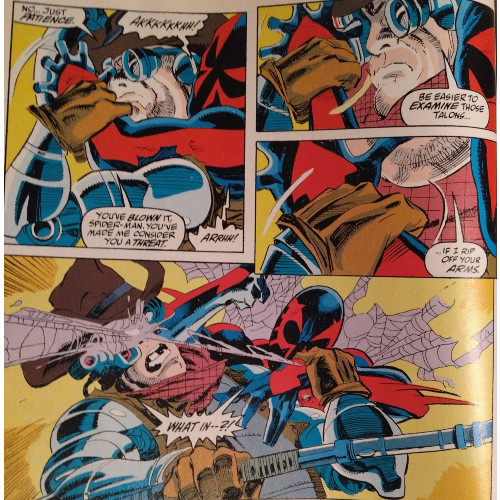
Upon opening the first issue of this series, readers are immediately greeted with a new time and a new world: New York, 2099. Rick Leonardi's pencils capture a world of wonder–while foregrounds deliver images of kids driving in flying cars and police officers (known as the "Public Eye") zooming around on airborne motorbikes, backgrounds add in a plethora of detail with jagged high rises and neon billboards. Details galore fill the first several pages, all serving to wrap the world of 2099 around the reader. David's dialogue contributes as well, introducing a new futuristic expletive ("Shock!") as well as phrases and names of people and places that will become important very quickly ("Public Eye," "flyboys," "corporate raider," "Rapture," etc.). In certain instances, his dialogue can come across as a little heavy-handed–in the first issue's double-page splash that gives us our first look at Spidey, an officer tells a couple of joyriders in the "Whisper 3000" to get lost; while an amusing detail, it feels a tad forced and one of the few times David's writing comes across as "Hey, look! We’re not in 90s New York anymore!" Otherwise, David and Leonardi work well to convince the readers we've entered a brand new world with brand new rules. This is a world that has existed long before we ever turned the first issue's first page, and you're sucked into New York, 2099 immediately. Re-reading this narrative draws my mind back to 2009, 90 years before our story begins, where a younger me was handed this volume by father. I devoured the contents, instantly drawn into the world David and Leonardi construct.
Elsewhere, David and Leonardi's pacing feels remarkably fluid. From the get-go, readers are dumped into an action sequence, a chase between Spidey and the Public Eye that sees our hero use some of his powers; from there, David introduces us to Spidey's alter ego, Miguel, his hologram companion Lyla, his boss Tyler Stone of Alchemax, his brother Gabe, and his girlfriend Donna. David gives us a lot to take in, but nicely parses out the details and intentionally introduces "snippets" of the world he and Leonardi are crafting. Do you have to know exactly what the Public Eye is or does to understand that they're the authoritative force of New York, 2099, similar to police officers, and that they're currently hunting Spider-Man? Do you have to fully grasp the ins and outs of how Alchemax runs business to know that they're up to no good? No, to both those questions. You can trust that David and Leonardi will lead you through the story and flesh out whatever introductory segments are given here. They're initially coy with some of the details, but not in a way that promotes trickery and not because they don't know where the story is going (unlike, dare I say, a few of their independent contemporaries from around the same time) Even in a graphic medium, the reader's imagination creates a fuller picture than what they can visually see, and David and Leonardi offer enough stimulating details to make the reader an active participant in envisioning this new world.
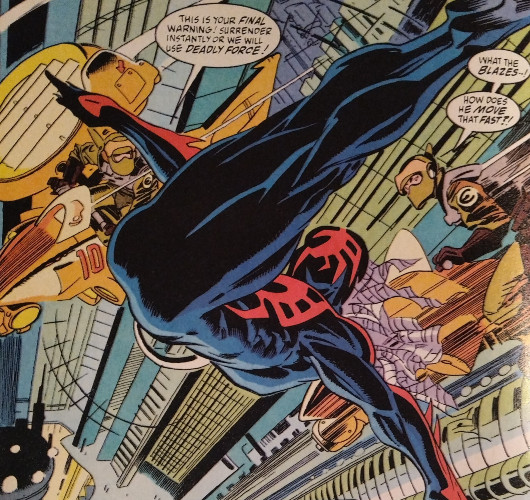
In constructing this world, David and Leonardi make the interesting decision in separating themselves from much of the mainstream comic universe of the modern era. References pop up every now and again–Lyla at one point takes the form of an elderly woman who looks and speaks suspiciously like Aunt May, Miguel refers to the "Age of Heroes" when talking about Spider-Man at one point, and a Dr. Doom of 2099 who may or may not be the same as the Dr. Doom of our modern day appears–but the story is largely devoid of concrete nods. Perhaps the most tangible reference to the Marvel Universe of the past comes from a Thorite, a disciple of the Norse God of Thunder, one of several who believe Thor will someday come again and wipe out the bastions of industry.
By keeping references to past continuity to a minimum, David and Leonardi help cement the 2099 universe as a unique one. And considering this is just a possible future for the mainstream Marvel Universe and not a wholly different dimension, it's a sensible decision. Consider comic book series such as Ultimate Spider-Man or even Peter Porker, the Spectacular Spider-Ham, which were set in universes wholly unrelated to Earth 616. These series, largely, felt the need to reintroduce Peter Parker in a different format–as a 21st century teenager and as a pig, respectively–and rebuilt Spidey's universe from those premises, rejiggering old continuity and characters to fit the mold of the new world. By setting Miguel's story in the future of the Marvel Universe, David and Leonardi create something new and different, not feeling wholly attached to prior continuity, while maintaining the foundation the Marvel Universe was constructed upon and creating a sense of comfortable familiarity.
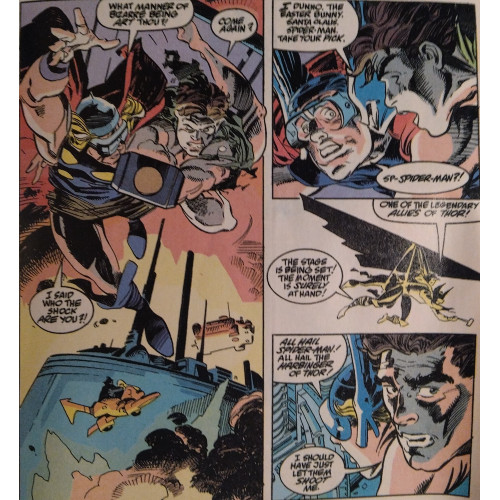
The character of Miguel O'Hara is, simultaneously then, similar enough to and different enough from Peter Parker to make longtime Spidey fans feel both relaxed and intrigued in the concept. Even set against the backdrop of flying cars and futuristic genetics, the series introduces us to a brilliant young man with a biting wit who has a loving caretaker and runs afoul of spider-based experimentation, donning a costume and fighting crime. Miguel's origin, however, isn't as laced with personal tragedy as Peter's; Miguel doesn’t let any criminals get away, nor does a beloved family member die because of his inaction. Elements of the tragic do flare up–Miguel, determined to leave Alchemax after witnessing some shady business practices in his department, is exposed to a highly addictive drug by his boss as incentive to stay. Miguel experiments on himself to erase the drugs from his system, and though this is successful, a jealous coworker's attempts to sabotage the experiment lead Miguel to develop fangs, talons, and spinnerets. Much like Peter, Miguel becomes the victim of "fate," as it were, as events beyond his own agency cause his powers. No wonder the Oscar Isaac-voiced version is such a grumpy stick-in-the-mud.
Unlike Peter, Miguel doesn’t go down a selfish, money-making route. David gives us a character who may not be imbued with a deep sense of the responsibility that comes with his powers, but Miguel doesn't intentionally use his powers for greed or personal achievement either. His one battle in this storyline, against the cyborg bounty hunter Venture, is solely for survival, a method David expertly uses to showcase Miguel's inexperience. Though he does avenge the death of a citizen by defeating Venture, cleaning up crime isn’t Miguel’s reason for donning the costume. He doesn't swear an oath to fight injustice on the graves of his parents like a certain costumed vigilante or in the name of his culture's ideals and personal values like a certain American/Kryptonian alien. Sadly for Miguel (but great for us!), his actions do put his costumed self in the spotlight and, thus, "Spider-Man 2099" is born.
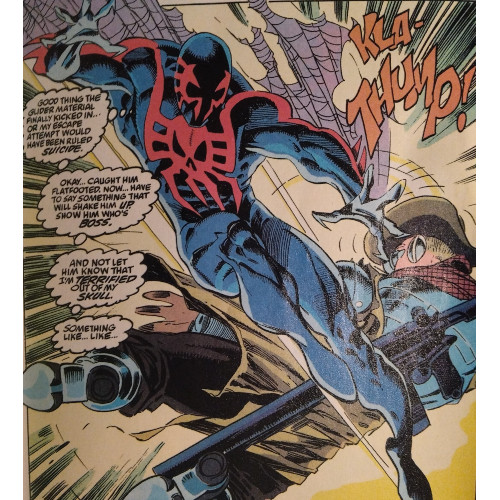
This feels like a fun twist on the classic "Parker Luck" scenario, wherein Peter's good intentions and actions, and even some of his victories, would ultimately backfire on him in some unfortunate way. Whereas Peter's do-gooder daring-do often lands him in additional hot water, we see that Miguel's actions, largely devoid of any intent to benefit the common man, bring him greater trouble. He's a guy who's just trying to deal with the hand that was dealt him, and it just so happens in working to cure himself, he ends up becoming a superpowered individual. It's difficult labeling Miguel’s actions as "selfish"..."self-preservation" is a far better term, at least for now. He wants to survive, he doesn't want his secrets revealed, but in gaining his powers, he'll soon find himself embroiled in conflict greater than he anticipated.
As the series goes on, we will see some additional references to older mainstream continuity in the form of other heroes and villains. But for now, Spider-Man 2099 feels more fresh than some other versions of the character. Spidey 2099 comes across as less of an adaptation and more of a new creation, but with just enough Peter Parker-esque traits to endear him to readers familiar with the character. Miguel O'Hara toes the line between feeling like classic Spider-Man and acting as his own character, and for the moment, that's a really good thing. You're not reading the original Spidey, but you still feel like you're reading a Spider-Man comic. It makes Miguel feel much more of a spiritual successor to Peter and less of an imitation or reworking of the character we Spidey fans adore. It's one of the reasons I fell in love with this series when I first started reading it, and as we move forward through additional issues, we'll hopefully encounter some of others.